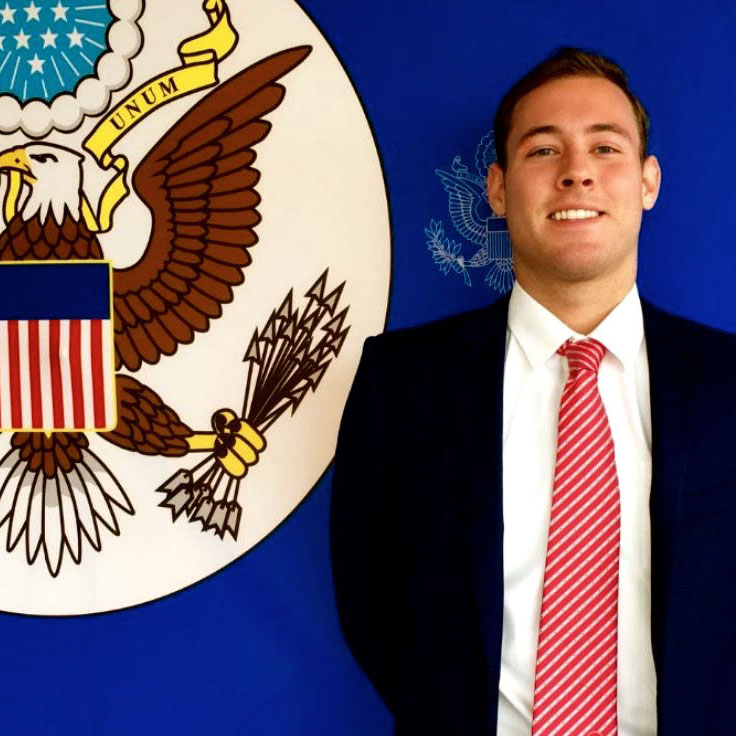Summer Job Diaries: Exploring International IP as USPTO Extern

Julius Bodie, a rising third-year day student at Loyola, is spending his summer as an extern at the U.S. Patent and Trademark Office Regional I.P. Attaché for Southeast Asia and Association of Southeast Asian Nations (ASEAN). His position is based in Thailand.
How did you land your summer job?
After taking Professor Justin Hughes’ course on Copyright and New Technologies, I mentioned I was interested in international law and foreign policy. He recommended I apply for a U.S. embassy position with the Foreign Commercial Service/United States Patent and Trademark Office.
How did the Career Development Center help you secure the position?
The Career Development Center helped me develop and fine tune my resume while providing helpful insights on applying for summer jobs.
What is the most interesting part of your job?
Traveling with the embassy throughout Southeast Asia implementing international trade policy and encouraging effective IP protection for U.S. stakeholders with Association of Southeast Asian Nations (ASEAN) trading partners has been a unique, engaging experience. The most fascinating part of the job is learning about cutting-edge trends in IP law and trade policy and using that information in diplomatic meetings between U.S. embassy personnel, key industry representatives and foreign diplomats.
What has been your most challenging assignment thus far?
My most challenging assignment thus far has been two-fold. I put together a comprehensive intellectual property rights toolkit for businesses looking to invest or work in Thailand. This involved reviewing various components of Thai legislation and their respective amendments. I then used the toolkit and similar resources to analyze both Thai and various ASEAN/Southeast Asian nations’ IP legislation to determine what steps were required for them to join the Trans-Pacific Partnership.
What new legal skill(s) have you acquired during your summer job?
Two new skills I have already acquired this summer are the ability to understand comparative nuances in foreign legislation and the ability to effectively communicate U.S. law and policy to a foreign audience.
How has your Loyola education helped you make a difference in your placement?
Loyola’s expansive course list gave me the background I needed to analyze international and foreign domestic law and understand modern trends in intellectual property legislation. The numerous professors who are scholars in areas of international and comparative law, particularly in the intellectual property realm, prepared me for this position.
What LLS courses have you found most helpful to your position?
The LLS courses that have been most helpful to this position are Copyright & New Technologies with Professor Hughes and Cyber & Intellectual Property Crimes with Adjunct Professor Ryan White. I have to work with many of the statutes and treaties related to copyright and new technologies, such as the Digital Millennium Copyright Act and the World Intellectual Property Organization internet treaties. Professor Hughes’ course delved into comparative law. It was the first time I learned to compare complex, nuanced differences between copyright law in the U.S. and jurisdictions such as the European Union, China, Australia and Japan.
Another critical part of the job is understanding global trends in cybersecurity and challenges that IP rights-holders face in the digital era. Professor White’s course explored the fundamentals of those areas of the law and was the perfect primer for this position.
In what additional ways has Loyola helped you map your career path?
Loyola helped me map my career path in a number of ways. Besides the courses mentioned above, the most substantive, practical experience I have received was spending a semester working full-time as a judicial extern for the Hon. Stephen V. Wilson, U.S. District Court for the Central District of California. Professor Laurie Levenson and Professor Rebecca Delfino encouraged students to explore clerkship options. For the first time in my legal education, I felt like I began to understand what it really means to be a lawyer. My experience on the Loyola of Los Angeles International & Comparative Law Review was also the first time I read and worked with foreign cases, scholarship and citations, which prepared me for understanding international legislation and case law. The experience of a semester in chambers combined with a summer abroad working in international trade and IP policy have shaped the lawyer and person I want to become.